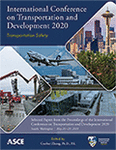International Conference on Transportation and Development 2020
Investigating the Impact of Driving Style on the Take-Over Performance in Level 3 Automation
Publication: International Conference on Transportation and Development 2020
ABSTRACT
Various daily driving habits and styles may be the reason why drivers show individual differences when taking over. The purpose of this paper is to investigate the impact of driving style on take-over performance in Level 3 automation. The simulator experiments in this study consisted of two parts: a manual car-following experiment and an automated driving take-over experiment. In the manual car-following experiment, researchers used the data of maximum braking deceleration, and maximum acceleration to classify 20 participants into two driving types (12 normal drivers, 8 aggressive drivers). Then the automated driving take-over experiment was conducted to investigate the influence of driving styles (normal, aggressive) on take-over performance in different take-over time budgets (7 and 5 s) and in combination with a visual secondary task. The researchers found that normal drivers took a significant severer brake than aggressive drivers only in the condition of 5 s take-over time budget + SuRT (i.e., the most urgent of all conditions). In addition, the driving style had no significant influences on take-over time, minimum TTC, and maximum lateral acceleration. Results indicate that normal drivers’ good habits do not make their take-over performance better, while the experience of aggressive drivers in manual emergency driving makes their emergency evasive maneuvers more stable in automated take-over.
Get full access to this article
View all available purchase options and get full access to this chapter.
REFERENCES
Delhi, S. I. N. (2016). Automotive revolution & perspective towards 2030. Auto Tech Review, 5(4), 20-25.
Eriksson, A., & Stanton, N. A. (2017). Takeover time in highly automated vehicles: noncritical transitions to and from manual control. Human factors, 59(4), 689-705.
Gold, C., Damböck, D., Lorenz, L., & Bengler, K. (2013, September). “Take over!” How long does it take to get the driver back into the loop?. In Proceedings of the Human Factors and Ergonomics Society Annual Meeting (Vol. 57, No. 1, pp. 1938-1942). Sage CA: Los Angeles, CA: SAGE Publications.
Gold, C., Happee, R., & Bengler, K. (2018). Modeling take-over performance in level 3 conditionally automated vehicles. Accident Analysis & Prevention, 116, 3-13.
Gold, C., Körber, M., Lechner, D., & Bengler, K. (2016). Taking over control from highly automated vehicles in complex traffic situations: the role of traffic density. Human factors, 58(4), 642-652.
ISO14198 (2012). Road Vehicles – Ergonomic Aspects of Transport Information and Control Systems – Calibration Tasks for Methods Which Asses Driver Demand Due to the Use of In-Vehicle Systems. ISO/TS 14198.
Körber, M., Gold, C., Lechner, D., & Bengler, K. (2016). The influence of age on the take-over of vehicle control in highly automated driving. Transportation research part F: traffic psychology and behaviour, 39, 19-32.
Lu, Z., Coster, X., & de Winter, J. (2017). How much time do drivers need to obtain situation awareness? A laboratory-based study of automated driving. Applied ergonomics, 60, 293-304.
Lucidi, F., Giannini, A. M., Sgalla, R., Mallia, L., Devoto, A., & Reichmann, S. (2010). Young novice driver subtypes: relationship to driving violations, errors and lapses. Accident Analysis & Prevention, 42(6), 1689-1696.
McDonald, A. D., Alambeigi, H., Engström, J., Markkula, G., Vogelpohl, T., Dunne, J., & Yuma, N. (2019). Toward computational simulations of behavior during automated driving takeovers: a review of the empirical and modeling literatures. Human factors, 61(4), 642-688.
Merat, N., Jamson, A. H., Lai, F. C., Daly, M., & Carsten, O. M. (2014). Transition to manual: Driver behaviour when resuming control from a highly automated vehicle. Transportation research part F: traffic psychology and behaviour, 27, 274-282.
Merat, N., Seppelt, B., Louw, T., Engström, J., Lee, J. D., Johansson, E., … & McGehee, D. (2019). The “out-of-the-loop” concept in automated driving: Proposed definition, measures and implications. Cognition, Technology & Work, 21(1), 87-98.
SAE J3016 (2018). Surface Vehicle Recommended Practice. Taxonomy and Definitions for Terms Related to Driving Automation Systems for On-Road Motor Vehicles.
Samuel, S., Borowsky, A., Zilberstein, S., & Fisher, D. L. (2016). Minimum time to situation awareness in scenarios involving transfer of control from an automated driving suite. Transportation research record, 2602(1), 115-120.
Stanton, N. A., & Marsden, P. (1996). From fly-by-wire to drive-by-wire: safety implications of automation in vehicles. Safety Science, 24(1), 35-49.
Ulleberg, P. (2001). Personality subtypes of young drivers. Relationship to risk-taking preferences, accident involvement, and response to a traffic safety campaign. Transportation Research Part F: Traffic Psychology and Behaviour, 4(4), 279-297.
Wan, J., & Wu, C. (2018). The effects of lead time of take-over request and nondriving tasks on taking-over control of automated vehicles. IEEE Transactions on Human-Machine Systems, 48(6), 582-591.
Zeeb, K., Buchner, A., & Schrauf, M. (2015). What determines the take-over time? An integrated model approach of driver take-over after automated driving. Accident Analysis & Prevention, 78, 212-221.
Zeeb, K., Buchner, A., & Schrauf, M. (2016). Is take-over time all that matters? The impact of visual-cognitive load on driver take-over quality after conditionally automated driving. Accident Analysis & Prevention, 92, 230-239.
Information & Authors
Information
Published In
International Conference on Transportation and Development 2020
Pages: 146 - 156
Editor: Guohui Zhang, Ph.D., University of Hawaii
ISBN (Online): 978-0-7844-8314-5
Copyright
© 2020 American Society of Civil Engineers.
History
Published online: Aug 31, 2020
Published in print: Aug 31, 2020
Authors
Metrics & Citations
Metrics
Citations
Download citation
If you have the appropriate software installed, you can download article citation data to the citation manager of your choice. Simply select your manager software from the list below and click Download.
